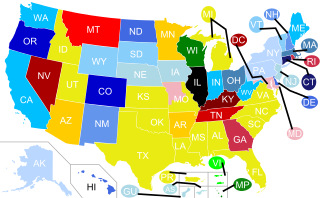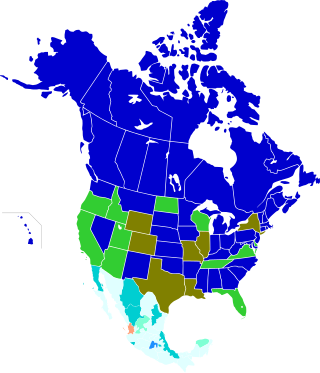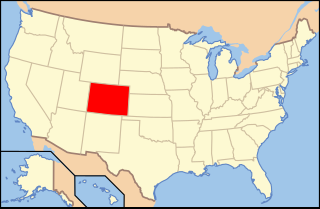Sex and the law deals with the regulation by law of human sexual activity. Sex laws vary from one place or jurisdiction to another, and have varied over time. Unlawful sexual acts are called sex crimes.

Sodomy laws in the United States, which outlawed a variety of sexual acts, were inherited from colonial laws in the 17th century. While they often targeted sexual acts between persons of the same sex, many statutes employed definitions broad enough to outlaw certain sexual acts between persons of different sexes, in some cases even including acts between married persons.

Lesbian, gay, bisexual, and transgender (LGBT) persons in Gabon face legal challenges not experienced by non-LGBT residents. Except for a period between July 2019 and June 2020, same-sex sexual activity has generally been legal in Gabon.
The crime against nature or unnatural act has historically been a legal term in English-speaking states identifying forms of sexual behavior not considered natural or decent and are legally punishable offenses. Sexual practices that have historically been considered to be "crimes against nature" include masturbation, sodomy and bestiality.

Lesbian, gay, bisexual, and transgender (LGBT) people in Nigeria face severe challenges not experienced by non-LGBT residents. LGBT rights are generally infringed upon; homosexuality is illegal in Nigeria and punishable by up to 14 years of prison in the conventional court system. There is no legal protection for LGBT rights in Nigeria—a largely conservative country of more than 225 million people, split between a mainly Muslim north and a largely Christian south. Very few LGBT persons are open about their sexual orientation, as violence against them is frequent. According to PinkNews, Nigerian authorities generally target the LGBT community. Many LGBTQ Nigerians are fleeing to countries with progressive law to seek protection.
The legal age of consent for sexual activity varies by jurisdiction across Asia. The specific activity engaged in or the gender of participants can also be relevant factors. Below is a discussion of the various laws dealing with this subject. The highlighted age refers to an age at or above which an individual can engage in unfettered sexual relations with another who is also at or above that age. Other variables, such as homosexual relations or close in age exceptions, may exist, and are noted when relevant.
The ages of consent for sexual activity vary from age 15 to 18 across Australia, New Zealand and other parts of Oceania. The specific activity and the gender of its participants is also addressed by the law. The minimum age is the age at or above which an individual can engage in unfettered sexual relations with another person of minimum age. Close in age exceptions may exist and are noted where applicable. In Vanuatu the homosexual age of consent is set higher at 18, while the heterosexual age of consent is 15. Same sex sexual activity is illegal at any age for males in Papua New Guinea, Kiribati, Samoa, Niue, Tonga and Tuvalu; it is outlawed for both men and women in the Solomon Islands. In all other places the age of consent is independent of sexual orientation or gender.
The ages of consent vary by jurisdiction across Europe. The ages of consent – hereby meaning the age from which one is deemed able to consent to having sex with anyone else of consenting age or above, provided that the encounter does not involve commercial sex or a person in a recognized position of authority – are between 14 and 18. Some countries have close-in-age exceptions allowing partners close in age to engage in sexual acts. The vast majority of countries set their ages in the range of 14 to 16; only four countries, Cyprus (17), the Republic of Ireland (17), Turkey (18), and the Vatican City (18), set an age of consent higher than 16. The laws can also stipulate which specific activities are permitted or specify the age at which one or other sex can legally participate. The highlighted age is that from which a young person can lawfully engage in a non-commercial sexual act with an older person, regardless of their age difference, provided the older one is not in a position of power, a relative, or is committing another form of exploitation. All jurisdictions in Europe have equal and gender-neutral age limits.

In North America, the legal age of consent relating to sexual activity varies by jurisdiction.

The age of consent in Africa for sexual activity varies by jurisdiction across the continent, codified in laws which may also stipulate the specific activities that are permitted or the gender of participants for different ages. Other variables may exist, such as close-in-age exemptions.

The Penal Code 1871 sets out general principles of the criminal law of Singapore, as well as the elements and penalties of general criminal offences such as assault, criminal intimidation, mischief, grievous hurt, theft, extortion, sex crimes and cheating. The Penal Code does not define and list exhaustively all the criminal offences applicable in Singapore – a large number of these are created by other statutes such as the Arms Offences Act, Kidnapping Act, Misuse of Drugs Act and Vandalism Act.

Lesbian, gay, bisexual and transgender (LGBT) people in Bhutan face legal challenges that are not faced by non-LGBT people. Same-sex sexual activity was decriminalised in Bhutan on 17 February 2021.

This is a list of important events relating to the LGBT community from 1801 to 1900. The earliest published studies of lesbian activity were written in the early 19th century.

A sodomy law is a law that defines certain sexual acts as crimes. The precise sexual acts meant by the term sodomy are rarely spelled out in the law, but are typically understood by courts to include any sexual act deemed to be "unnatural" or "immoral". Sodomy typically includes anal sex, oral sex, manual sex, and bestiality. In practice, sodomy laws have rarely been enforced against heterosexual couples, and have mostly been used to target homosexual couples.

In the United States, each state and territory sets the age of consent either by statute or the common law applies, and there are several federal statutes related to protecting minors from sexual predators. Depending on the jurisdiction, the legal age of consent is between 16 and 18. In some places, civil and criminal laws within the same state conflict with each other.

Lesbian, gay, bisexual, and transgender (LGBT) persons in the Seychelles face legal challenges not experienced by non-LGBT residents. Same-sex sexual activity has been legal since 2016, and employment discrimination on the basis of sexual orientation is banned in the Seychelles, making it one of the few African countries to have such protections for LGBT people. However, LGBT people may nonetheless face stigmatization among the broader population.

Lesbian, gay, bisexual, and transgender (LGBT) persons in the U.S. state of Colorado enjoy the same rights as non-LGBT people. Same-sex sexual activity has been legal in Colorado since 1972. Same-sex marriage has been recognized since October 2014, and the state enacted civil unions in 2013, which provide some of the rights and benefits of marriage. State law also prohibits discrimination on account of sexual orientation and gender identity in employment, housing and public accommodations and the use of conversion therapy on minors. In July 2020, Colorado became the 11th US state to abolish the gay panic defense.

Lesbian, gay, bisexual, and transgender (LGBT) persons in the U.S. commonwealth of Kentucky still face some legal challenges not experienced by other people. Same-sex sexual activity is legal in Kentucky, although the state legislature has not repealed its sodomy statute for same-sex couples. Same sex-marriage is legal in the Kentucky under the U.S. Supreme Court ruling in Obergefell v. Hodges. The decision, which struck down Kentucky's statutory and constitutional bans on same-sex marriages, and all other same sex marriage bans elsewhere in the country, was handed down on June 26, 2015.

Capital punishment as a criminal punishment for homosexuality has been implemented by a number of countries in their history. It currently remains a legal punishment in several countries and regions, most of which have sharia–based criminal laws except for Uganda.
Rape laws vary across the United States jurisdictions. However, rape is federally defined for statistical purposes as:
Penetration, no matter how slight, of the vagina or anus with any body part or object, or oral penetration by a sex organ of another person, without the consent of the victim.














